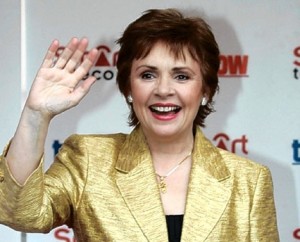
Dana set in motion a chain of wins that would secure Ireland’s place in the Eurovision record books. Her career has been a long and varied one but successful every step of the way.
Born Rosemary Brown on August 30th 1951 Dana was one of a large number of children born to Irish parents in Britain during the fifties and sixties. She was born and lived for the first few years of her life in London, her family moved to the British capital in search of work and Dana’s father found employment as a Porter in the famous King’s Cross Station train station.
The Browns were a devoutly Catholic Irish family and Dana has remained so throughout her life. Even though she grew up in Northern Ireland, which is part of the United Kingdom, Dana is from the Nationalist community which is mainly made up of the descendants of the original Irish people who lived there before the British occupation of Ireland. When the Brown family returned to Northern Ireland in 1956 it was still a relatively peaceful place, violence and sectarianism didn’t break out till the late sixties. Even the name of the city where Dana lived was a bone of contention between the two communities, the nationalists and the loyalists. On the nationalist side it is virtually always called Derry and on the loyalist side it’s called Londonderry.
Dana was eighteen years old when unrest in nationalist community about the discrimination of Catholics led to the civil rights movement. The troubles were quick to follow and this was the period in which she was to come to the public’s attention. In the early sixties Dana had begun to perform publicly with her two sisters, Susan and Eileen but both sisters later left the group due to family and career commitments. In 1965 she took part in a singing competition for which the top prize was a demo recording and won thw whole thing. Before she could record the demo she had to take her O-Level examinations in which she did quite well. With exams completed she headed for the recording studios and compiled an LP of several original tracks. As a result of the demo she was signed to Rex Records (Decca) in Dublin.
The record deal in turn led to her entering the 1969 Irish National Song Contest with the song ‘Look around’. The 1969 Irish final was a special one as all four people who had represented Ireland in the previous four years were competing to do so again. Dana was an unknown to Irish television viewers but this didn’t appear to harm her chances as she finished up second, albeit a distant one. Her involvement with RTE and the national song contest was not to finish there, later in 1969 she was invited by the contest’s Producer to compete once again in the 1970 edition. She accepted the offer on the basis that this was her last flirtation with show business, deciding to follow an academic route instead. The song that she was chosen to sing was ‘All kinds of everything’, of course. It was written by Derry Lindsay and Jackie Smith and arranged by the Eurovision winning composer Phil Coulter. Coulter was another Derry native and was a big name at the time having only won the contest three years previous with ‘Puppet on a string’. Dana obviously triumphed at the national final but there was little expectation from the public of an Irish win at the world’s largest song contest.
The 1970 contest was marred by the withdrawal of several countries. Norway, Sweden, Finland, Austria and Portugal were all upset with the mayhem of 1969’s four way tie and decided to sit out the contest in protest. Dana was the last participant to take the stage that night in Amsterdam and was full of nerves. She had full right to be hesitant, she was due to perform after such big names as Mary Hopkins for the United Kingdom, Katja Ebstein for Germany and David Alexandre Winter for Luxembourg. To add to all this pressure the stool she had to sit on while performing had no foot rest and she told in later interviews that she was in constant fear of slipping right off. From early on in the voting it was clear that Ireland was heading for its first win and it was going to be an impressive one. Out of a possible 110 points Ireland took 32, over a quarter. Dana’s nearest competitors were Mary Hopkins with 26 points and Germany with 12.
Dana capitalised on her Eurovision winning success by topping the charts in both the UK and Ireland. As well as the British Isles countries all over Europe and more far flung states such as Australia, Singapore and South Africa were to make her song a top ten hit. Upon her return to Ireland she was mobbed at Dublin airport. The contrast between her very low key departure from the Emerald isle and her rapturous return was astounding. The young Derry girl was not expecting such a welcome but gladly gave a quick rendition of her winning song from the steps of the plane. She was now a celebrity all over Europe but especially in Ireland and she remains to this day a person fondly thought of by many Irish people.
Over the next few years Dana’s single were hit and miss as far as chart success goes. After a disappointing run of chart flops she was dropped form Rex Records and in 1974 she signed with the new GTO label where her career really started to blossom. She became a chart regular with hits such as ‘Please tell him that I said hello’ and ‘It’s gonna be a cold cold Christmas’.
In 1974 Dana started filming her own TV series for BBC called ‘A day with Dana’. The show lasted for one season and BBC radio were also interested in the talented songstress and offered her the hosting role on ‘I believe in music’ which was previously hosted by fellow Eurovision participant Cliff Richard. She hosted the show for just one season in 1977. Her most successful outing on TV came when she hosted four full series of the BBC programme ‘Wake up Sunday’. She also filmed several Christmas specials and other various shows for RTE during the seventies.
It was in the midst of all this activity Dana was dealt a crushing blow. In late 1976 she was diagnosed with cancer of the vocal chords. An operation was quickly organised to remove the benign tumour, but it was thought that Dana may never sing again. It wasn’t long before she set out to prove those people wrong. She returned to her singing career in 1979 but not before she married her long term partner Damien Scallon in October of 1978. The first year of their marriage was overshadowed by another tragedy. The Ardmore hotel in Newry, which was owned by Damien, was destroyed in an IRA bombing campaign.
The eighties saw a change in the direction of Dana’s career. She became more focused on the religious aspect of her life and began to write Christian songs. She had previously appeared on several religious shows, even hosted two, but Christian music was never the mainstay of her repertoire. Dana and her husband wrote their first ‘faith song’ in 1978 on their honeymoon. In 1979 the then Pope, John Paul II, visited Ireland where he addressed crowds of up to one and a quarter million. Upon the suggestion of her husband the couple wrote a song based on the Latin motto of Pope John Paul II, ‘Totus tuus’ (Totally yours). Unfortunately Dana wasn’t able to be present at any of the Pope’s audiences in Ireland due to filming commitments.
Dana released two inspirational music albums at the start of the eighties, one was specially tailored for the large American Christian market. In 1982 she released a further two albums, one for the pop music market and yet another religious album. The start of the eighties also saw the birth of the first two Scallon children, both were girls and neither could stop Dana working for long. 1984 saw her first big break into America, a tour to promote her first two American faith albums led to bigger sales and the beginning of a following that would last for years to come. To top the year off she gave birth to her third child, this time she had a son.
The 1990’s brought another change in the Scallon family life with a move to America. Damien had a job at the Catholic Broadcasting Network EWTN. Dana presented several shows during her time there on both TV and radio. In 1993 she began her long association with the World Youth Day (An event celebrating Catholic values). Her song ‘We are one body’ was chosen as the theme song for the event. Since then she has also performed at the 1997, 2002 and 2008 World Youth Days.
1997 saw Dana embarking on her political career. She secured nominations from five county councils to run for the Presidency of Ireland. Dana ran a campaign based on family values. The result came as a shock to many with Dana finishing in a very respectable third, the highest placed independent candidate. She won nearly 14% of the vote and this became the launch pad to her future European plans. She won a European parliament seat in 1999 in the Connaught-Ulster constituency. She lost the seat in the elections of 2004 winning only 13.5% of the vote. Later that year she again tried to contest the Irish Presidential election but this time failed to secure the necessary five county council’s backing. Since then she has refrained from returning to politics.
Dana continues to appear on national television in different ways. Talk show appearances and guesting as a judge on several shows has kept her in the public eye.
2007 was a busy year for the ageing songstress. She revisited her music career by releasing a new album with several cover versions. She also saw the launch of her second autobiography ‘All kinds of everything’ obviously named after her Eurovision winning song.
Her most recent public outing and Eurovision connection were one and the same. In February of 2008 Dana was a judge on Ireland’s selection for the 2008 Eurovision Song Contest. Her fellow judges were Louis Walsh and 2007 Eurovision winner Marija Serifovic. Dana came out very strongly against the public’s decision to send Dustin to Eurovision and was unfairly booed at the national final.
She has had a very successful career, one that is currently in its fourth decade. Dana set Ireland on its way to a record seven victories at the Eurovision Song Contest and has played a big part in the social and cultural fabric of the island of Ireland over the last 38 years.




















